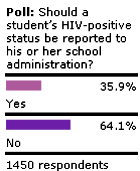Poll: Should a student’s HIV-positive status be reported to his or her school administration? [October 2008]

Poll closing results.
October 2008. |
October 2008 - Adults with HIV/AIDS are protected against disclosure of their status in both the public and private sectors by constitutional law and the Americans with Disabilities Act respectively. But at least four states—Illinois, Missouri, Nevada,and South Carolina—mandate that local health departments disclose the HIV-positive status of a minor to school officials. In the past year, attempts in Illinois and South Carolina to repeal this legislation and set standards to protect the confidentiality rights of minors living with HIV/AIDS have failed.
Advocates of disclosure laws argue that an HIV-positive student’s status should be revealed to an appropriate school official for the safety of other students and staff. Many supporters of such laws cite the theoretical example of a fight among students or a sports injury during which blood may be exchanged. In reality, there are no documented cases of HIV being transmitted in this way
The potential for discrimination against HIV-positive students is great, however. In a society in which stigma is still strongly attached to HIV, knowledge of a student’s HIV-positive status could lead to discrimination by staff, students, and parents. Many people still believe that HIV can be spread through touch, saliva, tears, or sweat—inaccurate ideas that could cause staff and other students to isolate and even torment an HIV-positive student.
Today, young people are at significant risk for HIV infection. According to CDC estimates for 2004, approximately 13 percent of people diagnosed with HIV/AIDS were between 13 and 24 years of age, with 70 percent of those infections occurring among African-American youth. With the growing HIV/AIDS epidemic among this group, it is important that young people be tested for HIV. But laws and regulations that require local health departments to report an HIV-positive student’s status to school officials may deter young people from getting tested.
Sources
CDC. “HIV/AIDS Surveillance in Adolescents and Young Adults.” Slide set: 2008.
CDC. “Antiretroviral post-exposure prophylaxis after sexual, injection-drug use, or other non-occupational exposure to HIV in the United States: recommendations from the U.S. Department of Health and Human Services.” MMWR: 2005.